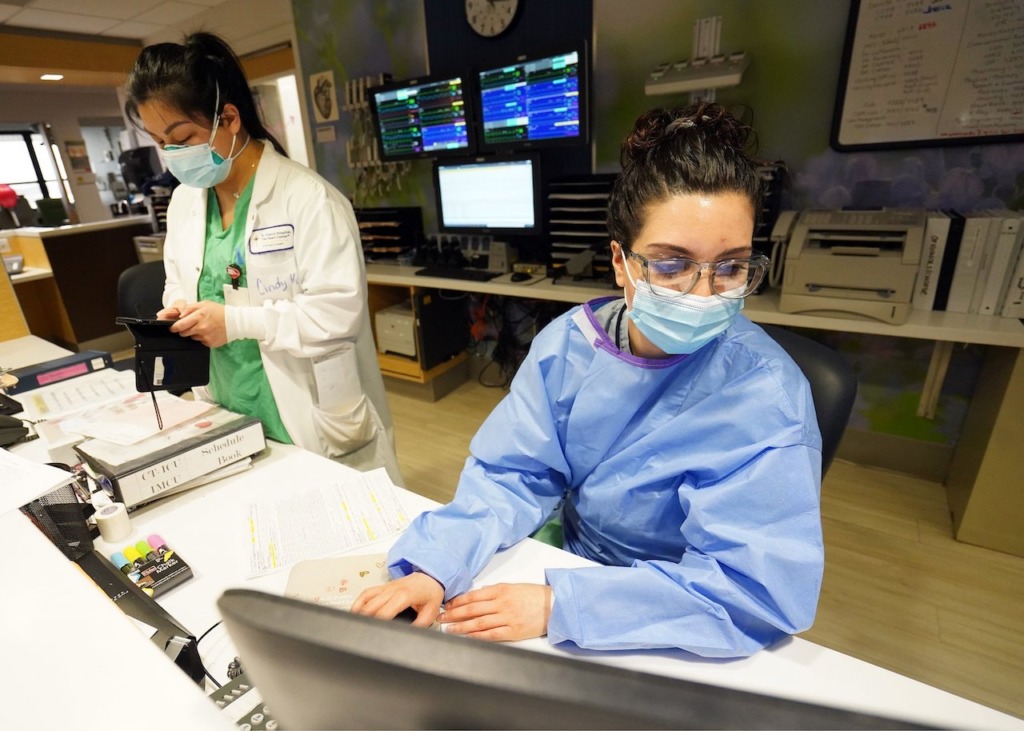ORLANDO, Fla. (OSV News) – The U.S. Conference of Catholic Bishops June 16 authorized a process, during its spring plenary assembly, to revise its “Ethical and Religious Directives for Catholic Health Care Services” in order to provide guidance to Catholic health care facilities when it comes to treating people who experience gender dysphoria and identify as transgender.
In a voice vote, the conference authorized the USCCB’s doctrine committee to move forward with plans to revise part three of the ERDs, which concerns the relationship between Catholic health professionals and their patients and patient rights.
Bishop Daniel E. Flores of Brownsville, Texas, chairman of the doctrine committee, said the proposal to revise the document is twofold: “to reaffirm the ethical standards of behavior in health care” and to “provide authoritative guidance on certain moral issues that face contemporary health.”
The move comes as the issue of gender dysphoria becomes an increasingly controversial political issue in the U.S.
Noting the section in question has not been revised since 1994, Bishop Flores said “at that time, it was not envisioned that it might be necessary to include specific guidance concerning radical modifications of the human body, such as are widely advocated in practice today, the treatment of those suffering from gender dysphoria.”
Bishop Flores said potential changes would be “limited and very focused” in nature, and the committee will “consult extensively with bishops, moral theologians, medical ethicists, physicians and other various stakeholders in the field of Catholic health care.”
“Once a revised draft is completed by the committee, it will be subject to review discussion and not only the vote of a whole body of bishops,” he said.
Once the proposal was opened to questions from the bishops, several raised the importance of approaching the issue with sensitivity and concern to individuals who identify as transgender, and to seek their input.
Cardinal Robert W. McElroy of San Diego said the “centerpiece” of any possible revision should be the question of “how do we help people wrestling with dysphoria?”
Cardinal Joseph W. Tobin of Newark, New Jersey, also urged the bishops to hear the perspective of “people who are from the trans community.”
Bishop Flores praised the calls for a “pastorally sensitive” approach to the complex topic.
The conference did not make clear what particular changes would be made to the document. Archbishop Timothy P. Broglio of the U.S. Archdiocese for the Military Services, president of the USCCB, made clear in response to a question from OSV News that the vote to revise the ERDs was simply a procedural move to begin that process.
“It will be up to the committee on doctrine to determine what sort of considerations will be included in that revision,” Archbishop Broglio told reporters June 15 when asked about what changes may be considered in the update of the ERDs. “When they’re ready with that document, it will be presented to the bishops, perhaps in the fall assembly.”
The issue of gender dysphoria has become increasingly controversial as several states have moved to restrict gender reassignment procedures for minors or to block student athletes who identify as transgender from competing on sports teams opposite their biological sex.
Catholic dioceses have begun to grapple with pastoral approaches to individuals experiencing gender dysphoria. In 2022, the Diocese of Sioux Falls, South Dakota, issued guidelines for youth who identify as transgender, stating that diocesan schools should uphold “conformity with the student’s biological sex as determined from conception and manifest at birth and at the time of the student’s enrollment.”
The Diocese of Des Moines, Iowa, also issued guidance and policies in January on ministering to people experiencing gender dysphoria, calling for coherence with the church’s teaching on the inseparability of gender from biological sex while emphasizing pastoral compassion for children and adults wrestling with conflict between their sex and gender.
Bishop Flores told the U.S. bishops that the doctrine committee would seek to “incorporate the guidance” of their doctrinal note released March 20, which concerned interventions that “involve the use of surgical or chemical techniques that aim to exchange the sex characteristics of a patient’s body for those of the opposite sex or for simulations thereof.”
“Any technological intervention that does not accord with the fundamental order of the human person as a unity of body and soul, including the sexual difference inscribed in the body, ultimately does not help but, rather, harms the human person,” the document states.
A 2022 study by the UCLA Williams Institute found approximately 1.6 million people in the U.S. age 13 and older who identify as transgender.

